Pop-up campers are the ideal low-cost solution for people wanting to enjoy the RV lifestyle.
The problem many shoppers have is not understanding how pop-up camper weight affects their vehicle’s ability to tow it safely.
Just because these foldable travel trailers are lightweight doesn’t mean you can tow them with any car or truck.
That’s why I provide all the crucial details about pop-ups right here in this guide. Inside, you’ll find:
- The varying weights of different pop-up camper models, including specific examples
- The impact of pop-up camper amenities on the overall weight
- A straightforward guide to essential weight ratings for campers, hitches, and vehicles
- A list of cars and SUVs capable of towing pop-up trailers
- Key factors to keep in mind while packing for a camping adventure
- The necessity of trailer brakes for your pop-up camper
To safely reach any camping destination, I recommend using a powerful tow vehicle, staying under the weight recommendations for carrying capacity and packing correctly. All the information to make this happen is down below, so let’s dig in!
How Much Pop-Up Campers Weigh With 15 Examples
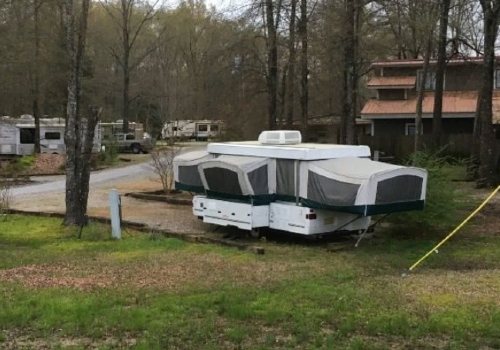
For quick reference, the average weight of a pop-up camper is 2,000 pounds. The lightest pop-up models are as low as 350 pounds, while the heaviest come in at 4,500 pounds.
Pop-up campers come in many sizes. To help you compare top models, I separate them into three weight classes from smallest to largest.
Small Pop-Ups – 12 Foot and Under Box Length
Small pop-ups weigh from 350 to 1,000 pounds. Many smaller vehicles that offer a tow rating can pull these lightweight campers.
Most smaller pop-ups are for solo or couple camping, but some basic models can fit a small family.
Top Five Pop-Up Campers Under 1,000 Pounds
| MODEL | WEIGH, lbs. |
| Livin’ Lite Quicksilver | 6.0 – 694 |
| Coachman Viking | 761 |
| Earthcruiser MOD (Truck camper pop-up) | 800 |
| SylvanSport Go | 840 |
| Livin’ Lite Quicksilver | 8.0 – 865 |
Medium Pop-Ups – 12-20 Foot Box Length
Medium pop-up campers weigh an average of 1,500 pounds. These campers usually have two sleeping areas in the fold-outs and a living space with a compact kitchen area.
These campers are best for small families or couples who want more space to spread out while camping.
Top Five Mid-Weight Pop-Up Campers – 1,000 to 2,000 Pounds
| MODEL | WEIGH, lbs. |
| Adventure Trail TurtleBack | 1,300 |
| A-Liner Scout | 1,395 |
| Jayco Jay Sport 8SD | 1,535 |
| Forest River Flagstaff 206 LTD | 1.608 |
| Coachmen Viking 1706XLS | 1,642 |
Large Pop-Ups – Over 20 Foot Box Length
Top Five Large Pop-Up Campers Over 2,000 Pounds
| MODEL | WEIGH, lbs. |
| Forest River Flagstaff SE 207SE | 2,076 |
| Somerset Utah | 2,650 |
| Coachmen Clipper Classic | 2,702 |
| Air Opus | 2,870 |
| TrailManor 3326 King | 4,006 |
Large pop-ups typically need the towing capacity power of an SUV, but the trade-off is much more living and sleeping space and convenient amenities like a bathroom, kitchen, heater, adjustable coverings for better weather protection, and plenty of storage.
Large pop-ups are ideal for families and full-time or seasonal camping couples who like the ease and fuel savings of travel a foldable camper provides.
How Camper Amenities Affect Pop-Up Camper Weight
Pop-up campers can range from bare-bones to luxury models. The larger and more fancy floorplans will be heavier due to more lumber and steel put into the overall build.
When you start to upgrade the pop-up with accessories like stoves, bathrooms, refrigerators, air conditioners, fans, bike or boat racks, spare tires, or extra propane tanks, the weight will increase dramatically.
Swapping out poor-quality mattresses for something more comfortable will also come at a “weighty” price, as thicker beds with more support are heavier than the foam pads in many pop-ups.
Tons of storage in a pop-up can also be a secret source of issues. Once you fill all those nooks and crannies, you can easily exceed your towing capacity. Take any salesperson raving about all the storage a pop-up model has with a grain of salt.
Making your pop-up as cozy as possible is an excellent idea since it will make camping more stress-free, but keep in mind your vehicle’s towing capacity.
An affordable pop-up trailer that can fit your big family for weekend camping won’t be such a deal if you end up needing to buy a new vehicle with higher towing power.
Breakdown of Camper Weight Ratings
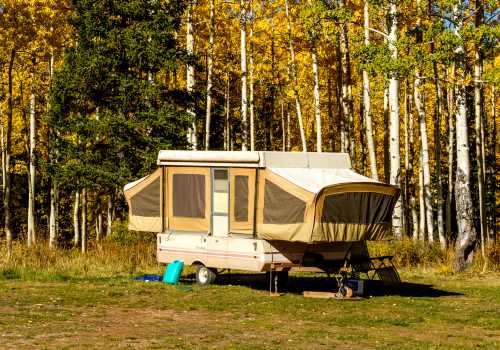
Aside from your vehicle towing capacity, there are several other weights or ratings you’ll need to clearly understand before buying or traveling with a pop-up camper.
All of these numbers should be available in the camper’s manual, on the unit itself, or by looking up the vehicle identification number. You must also match your hitch rating to your camper’s weight so it can securely pull the trailer without failure.
UVW (Unloaded Vehicle Weight)
The UVW is the standard weight rating given to a pop-up trailer by the manufacturer. The weight includes the main camper components, axles, full propane (LP) tank, and the tongue/hitch weight.
RV sellers love to highlight the UVW since it makes the pop-up seem more lightweight, which increases the chance it will fall within your vehicle’s towing capacity. But, unless you plan never to add supplies to the camper, this number is only a benchmark and not the most important for actual use.
CCC (Cargo Carrying Capacity)
The CCC is the extra weight you can safely add to the camper for towing without causing axles or other components to fail. Each manufacturer will specify a CCC weight for each model of pop-up they make.
Supplies like food, water, camping gear, etc., add up quickly, so always get out the scale and weigh items as you add them to the pop-up so you can stay below the CCC number. Try to keep your cargo to around 10% of the UVW.
GAWR (Gross Axle Weight Rating)
The GAWR is the number that is most important to stay within when towing a travel trailer. The rating is the maximum amount of weight the camper’s axle can support and will include the UVW and CCC.
As most pop-ups only have one axle, it needs to handle all the weight of not only the actual camper structure but all the supplies you load inside. Very long pop-ups do have dual axles.
GVRW (Gross Vehicle Weight Ratio)
The GVRW combines the camper dry weight, cargo-carrying capacity, tongue (or hitch) weight, and the weight of occupants during use.
Since a pop-up is not a motorhome, where people’s weight is part of the “cargo,” you don’t need to concern yourself with counting that number toward your weight total for travel.
But, you must be aware that a family of four can add 400-600 pounds on average to the camper’s weight. Any extra weight over the GVWR puts undue strain on the axles or flooring and may cause damage.
GTW (Gross Trailer Weight)
The GTW is the total weight of UVW and cargo you load into the pop-up.
You need to know your gross trailer weight to determine your hitch weight requirements.
Hitch (Tongue) Weight
Hitch weight, also called tongue weight, is the amount of downward force the trailer puts on the camper hitch.
The rule is that the hitch weight should never exceed 10% to 15% of the gross GTW.
The purpose of knowing the correct hitch weight is to ensure the camper load is in balance over the axle and not forcing down too much on the back of your tow vehicle.
There are several ways to find the hitch weight of your pop-up trailer at home or by using a commercial scale found at truck stops.
NOTE: You’ll often hear RVers state the “experts” recommend having around 60% of the cargo weight favoring the hitch side of the camper.
This ratio doesn’t mean you push more of your belongings toward the front of the camper before travel, and you’re good. This trick only works out if the hitch weight falls under 15%, as anything over that is dangerous.
10 Cars and SUVs with Excellent Pop-Up Trailer Towing Capacity
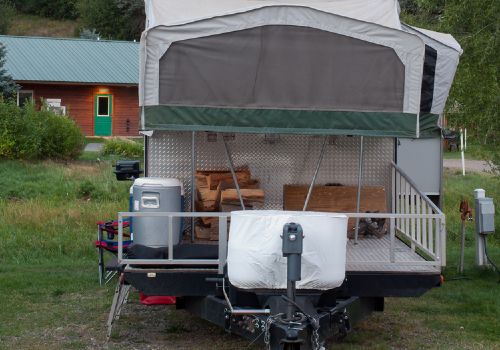
Before we jump into the cars and SUVs with a high towing capacity, let me answer a couple of common questions about vehicle towing capacity.
How Much Towing Capacity Do You Need for a Pop-Up Camper?
To safely tow the heaviest pop-up, including all your camping gear and passengers, your vehicle will need to have a 5,500-pound towing capacity.
Want to Connect With a Community of Over 1,078 RV Enthusiasts?
Luckily, if your car or SUV has a lower towing capability, there will most likely be a pop-up camper that can work for your needs.
Heck, they even make pop-ups you can tow with a motorcycle, like the Kompact Kamp Mini Mate. These handy camping trailers for motorcycles weigh between 250-400 pounds.
Should You Buy a Pop-Up With a Dry Weight That Matches the Towing Capacity of Your Vehicle?
Always remember that the weight your tow vehicle must be able to handle is a fully loaded pop-up, not the empty trailer.
What this rating weight means is if you own a vehicle with a 3,500 tow capacity and go shopping for a camper, don’t get all excited about the 3,000-pound trailer the salesperson is trying to sell.
Once you pack that pop-up for a trip, you are sure to exceed the safe towing capacity of your vehicle.
Top 10 Vehicles for Towing a Pop-Up
Here are the best cars and SUVs with ample tow ratings for pop-up campers.
| MODEL | WEIGH, lbs. |
| Chrysler Pacifica | 3,600 |
| Subaru Outback 2.4L Turbo Engine | 3,500 |
| Ford Fusion | 3,500 |
| Volvo C30 | 2,000 |
| Toyota Corolla | 1,500 |
| Ford Expedition | 9,300 |
| Dodge Durango | 8,700 |
| Lincoln Navigator | 8,700 |
| Chevrolet Tahoe | 8,600 |
| GMC Yukon | 8,500 |
SUVs provide the maximum towing capacity of non-truck vehicles, but with a wide array of super-lightweight pop-ups on the market, many cars can also pull a trailer.
What to Consider When Packing for a Camping Trip
The first thing to consider when loading up your pop-up for a camping getaway is to try to pack sparingly. Packing light provides these benefits:
- Better fuel economy
- Less wear and tear on the camper and tow vehicle
- More control over the trailer while driving
- Short braking and acceleration times
- Less “stuff” to unpack and repack at your campsite
Water weighs eight pounds per gallon and is essential when boondock camping. Instead of wasting precious pounds on water pre-trip, try to load up just before you reach your campsite.
Pack the camper so more weight is toward the front, as long as it doesn’t exceed the tongue weight rating. Having a bit of pressure on the rear of the tow vehicle improves control and traction.
If the weight favors the rear of the pop-up travel trailer, it will cause lifting at the hitch location, raising the rear tires of the tow vehicle enough to lose control more easily under highway speeds.
Trailer Brakes – Are They Necessary on Pop-Ups?
You should always have trailer brakes on trailers that weigh over 3,000 pounds since most state laws require it. Many bigger pop-ups come with trailer brakes as a standard or optional accessory.
In general, it’s best to install brakes on any weight or size of a trailer, as they improve safety under many conditions, such as:
- When stopped on an incline – it takes the pressure off your tow vehicle
- Faster stops during unexpected braking situations
- When roadways are slippery due to rain, snow, or ice, the trailer moves and stops with your vehicle more reliably
There are two types of trailer brakes. The most common has a wiring harness with a socket up by your hitch, so you can hook up to your vehicle’s brake system during towing.
There are also hydraulic trailer brakes (also called surge or inertia brakes) that work independently of the tow vehicle and require no wiring, which makes hooking up your camper even easier.
Pop-Up Camper Weight Wrap Up
Pop-up campers are the perfect fit for those who want a step up from tent camping but prefer an affordable, easy-to-store recreational vehicle they can tow without a heavy-duty truck.
Finding the perfect pop-up should be a breeze now that you know all the vital information inside this guide to pop-up camper weight.
Choose from any of the best pop-up models by class, or shop around until you find the right camper in the safe weight range for your vehicle.
When buying a pop-up, weight plays a critical role in both the camper and how you pack it. So, follow the tips above to enjoy fun and safe camping adventures!
6 Things You Must Check Before You Buy a Pop-Up Camper (Video)
"Man cannot discover new oceans unless he has the courage to lose sight of the shore."
-- Andre Gide

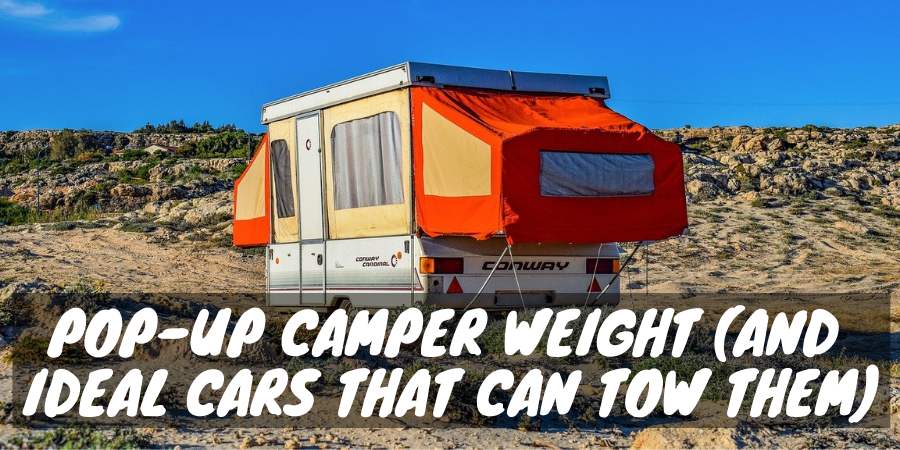




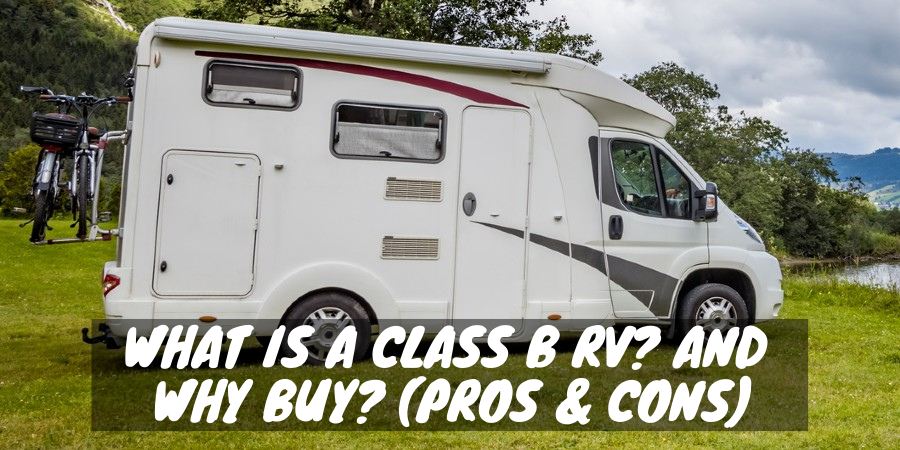


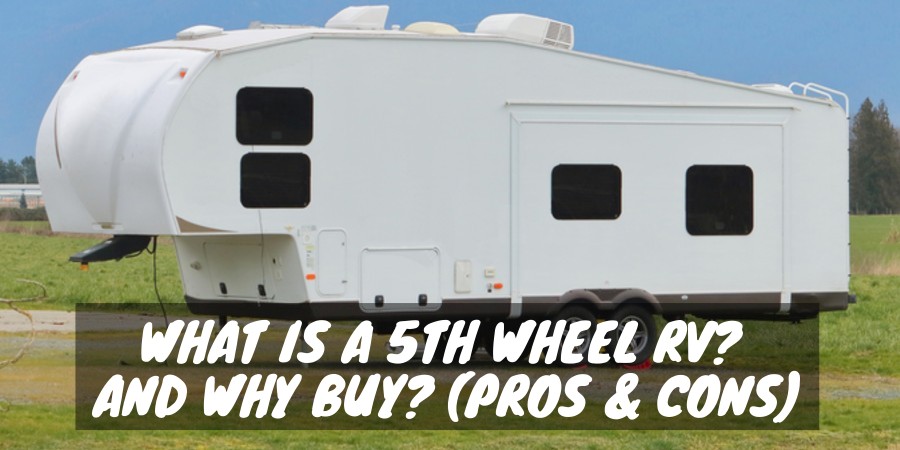
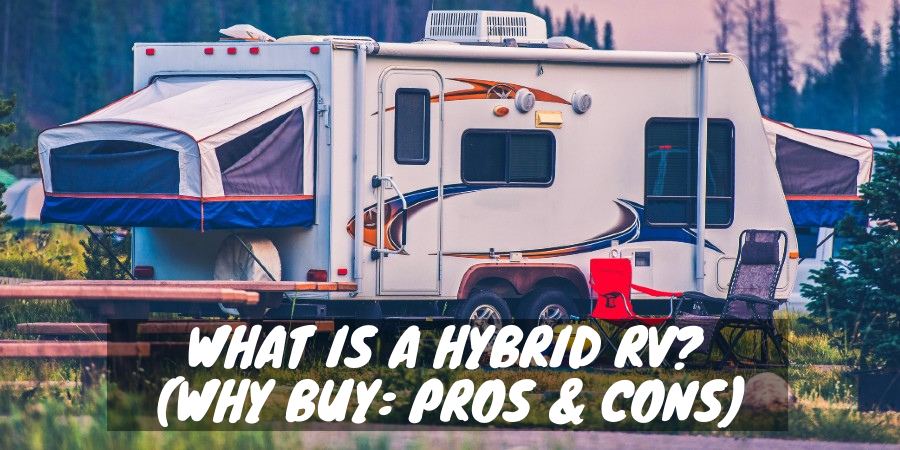
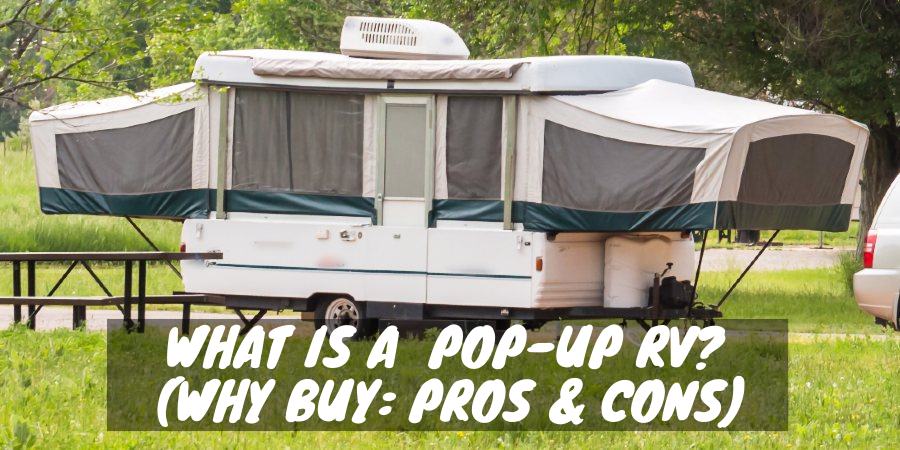
This is very helpful as we are looking into getting a popup and have a small suv! Thanks!